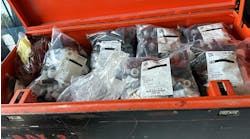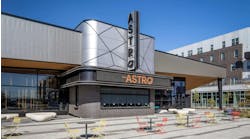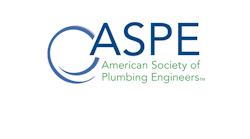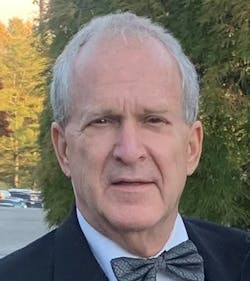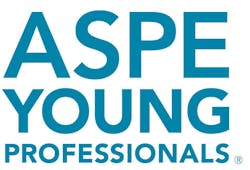Latest from Plumbing
Sponsored
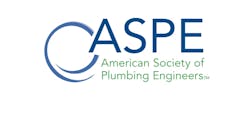
By Rob McManamy, Editor-in-Chief, HPAC Engineering
[Editor's Note: this Q&A is an edited transcript of one of HPAC Engineering's "On the Air" podcasts. To listen to the original podcast, visit the HPAC Members Only page at www.hpac.com/members.]
Our guest this month is Jim Zebrowski, PE, CPD, FASPE, new president of the American Society of Plumbing Engineers (ASPE), and a plumbing /fire protection engineer with DLR Group in Atlanta. Zebrowski has been an active member of ASPE for 36 years now and was elected to the top spot for a two-year term this September in Indianapolis. He spoke with us about the goals of his presidency and his views on the role of character in all that we do.
HPAC: Jim, thanks so much for joining us, just weeks after being elected president at the ASPE Convention in Indianapolis in September. Before we get into any plans for your presidency, though, please give us a brief history of your experience in this industry and how you came to your current position at DLR...
I thought that was the greatest thing in the world.
So that's how it all started and I did drafting for electrical, HVAC and plumbing. And then about three months after that, our plumbing designer left. So they came to me and said, "Do you want to be our plumbing designer?" I said, "Sure!"
Now back in those days (40+ years ago), we didn't have the internet. So you had to go to the bookshelf and grab the code books and read through those. That's how I started learning the profession. We did a lot of engineering for schools back then. And I think we literally did the design for every middle school and high school in the State of West Virginia. And we did everything, start to finish, on those.
I was still going to night school at Ohio State at the time, but since these schools were fairly remote, we had to do independent systems and all the site work, including sewer treatment plants, water supply systems, etc. So it was a pretty good learning experience and I worked there for about four years before I was offered another job with a slightly larger mechanical engineering firm.
There, I did both HVAC and plumbing design and got more experience before an A/E company in Albany NY called and offered me a job. So, I moved there and that's when I first started attending ASPE meetings.
HPAC: Please tell us about that. How did you end up on the leadership path at ASPE?
JZ: Well, that was about 36 years ago now. When I first started attending, we had to go to meetings in Central NY because there was no chapter in Albany area. So, I got involved there and we decided to form a satellite chapter for the Capital Region in NY. And when we did that, I became a board member for the chapter. So that's when the leadership roles started. Probably around 1986-87.
HPAC: So you have certainly seen the industry grow and evolve since then. Today, of course, is truly an extraordinary moment for the U.S. and the world, emerging from a global pandemic while also committing to improved water and air infrastructure to improve public health. How do you see ASPE contributing to this broader effort over the next two years of your presidency?
JZ: Well, we have all faced that crisis and seen how it's affected health. Coupled with that, we've got a lot of failed infrastructure in various places. We've seen issues with well water, failed backflow systems, failed piping. So we need to be the ones who offer those solutions. So, yes, it's been a tough two years. But at ASPE, we had a number of initiatives in place already. We have a number of subcomittees now, including a Legionella working group. And we've been working with several other groups and associations on these matters.
HPAC: With that Legionella working group, I often feel like that issue has fallen off the radar a bit. Could you please update us a bit on that? Would you say that work is as important and as relevant as ever?
HPAC: Will new federal infrastructure funding help to propel some of these efforts?
JZ: ASPE is not directly involved with that. But all of these failing systems need a complete overhaul. So we will be monitoring this because that's where all of that spending is going to start.
HPAC: Looking ahead, what is ASPE doing to help member firms to recruit next generation engineers? Has focus on that next-gen issue increased over the last two years?
JZ: Yes, it has increased, and that's one of the things I want to focus on probably the most in my term. We've got a lot of things in place. We just need to make sure that our information gets out. For instance, for our chapters, we have an ASPE Resource Center on our homepage. It's got things on there like templates for recuitment letters that chapters can send to prospective members.
There separate letters that we can send to employers in different cities to make them aware of ASPE and to make sure their designers are in touch with our members. They will want to make sure that their designers are on the cutting edge of what's new. So we will help them to learn what they need to know and what they need to get done.
We also have outreach programs at colleges and even in grades eight through 12. It's important to get young people thinking that the plumbing industry is vital to the health of, well, the world. We've had people at the chapter level, and the society level, going to those schools to get the word out.
HPAC: How would you say today's engineering graduates are different from you and your classmates when you entered the field way back when?
What I would like to see more of is—and I hate to distinguish people by age groups—but many younger designers now tend to value their time such that they just leave work at the end of the day. And I agree that it is important to separate your work life and your home life. But it's also important that if they want to advance and contribute more, they may want to attend an ASPE or ASHRAE meeting to learn more.
I've come to realize over the years that education is really what's going to help you to move on. It helps you in your job and helps you in your career. So you should really take advantage of the opportunities out there. The more you know, the more valuable you are. Sure, you can get CEU's online. But you should also get out to meetings, too. Network with people. That's really important, and I think many are missing out on that.
HPAC: At this stage of the pandemic, mask restrictions have been dropped and so many have been vaccinated and boosted. It seems like there is a hunger among many in the industry to get back out there. Indeed, there seemed to be a real energy at the ASPE Convention in Indianapolis in September. Do you think that enthusiasm will continue to grow?
JZ: I do. I think our recent convention and even our symposium last year in San Diego have shown that our people are feeling like they are done with the pandemic time and are ready to get back out and see things... We do our convention and expo every two years, and in the intermediate year, we do our technical symposium. We've got our next one of those coming up in Bellevue, WA, September 28 to October 1, 2023. That's more focused on the educational seminars, but does include a smaller products show for the local vendors there.
As you noted earlier, "next generation" is an issue, and that's something that all engineering groups and societies like ASPE and ASHRAE need to address. We've got to get young designers up to speed and interested, and into leadership positions. After all, they are the future leaders of our group.
HPAC: Lastly, I read in an earlier interview that you had done with ASPE a few years ago that you counted being a student of military history among your hobbies and you noted separately that the great World War II film Casablanca was your favorite movie. It is also one of my favorites. It occurred to me that issues of character, courage, and even sacrifice are common to both those areas of interest? How would you say those traits have influenced your career and how might they help to guide young engineers joining the profession today?
JZ: That's a very interesting question. Yes, 'Casablanca' is my favorite movie, and if it's one of yours, then you understand, too. That does represent self-sacrifice, and at least as important, character, too. In my opinion, I really think character is all you have to go by. That is what you will be remembered for, your character. And that's something you've got to live up to every day.
As an example, about three years ago, even before the pandemic, I started this online fitness program, and I've been able to stick to it. They do a good job with the trainers they get to motivate you, and one of the things they say has really stuck with me. When you're near the end of your workout and you really want to quit, they say, "You can't quit now. You have to honor this workout. Honor your body."
I think that parallels how I feel about work. Each day you go into work, I think you need to honor your job. Honor your profession. Focus, follow through, and deliver... That's the way I live, and that really has helped me in my approach.
HPAC: Well, that seems like a great place to end here. Thanks so much for your time, Jim. Maybe we can check back in with you in a year for a halftime report on your two-year term.
JZ: A "focus and deliver" pulse check. I'd like that. Thanks so much for having me here today.
To read the latest installment of Zebrowski's "From the President's Keyboard" blog, visit www.aspe.org/pipeline/november-2022-from-the-presidents-keyboard-does-your-chapter-have-an-ambassador-program/.
